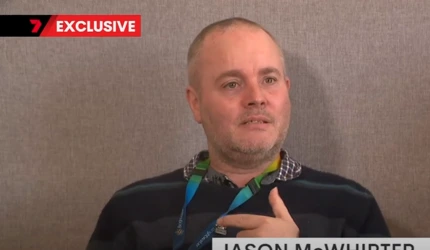What Is Young Onset Dementia?
When we think of dementia, we often picture an elderly person struggling with memory loss.
But for more than 29,000 Australians in 2025, dementia begins much earlier - sometimes in their 40s or 50s. This is known as Young Onset Dementia (YOD). In Western Australia, the figure could potentially be even higher, highlighting the importance of localised awareness and resources.
Young onset dementia, sometimes referred to as early onset dementia, describes dementia that develops before the age of 65. People living with this condition often fall through the cracks of the support system, as they are typically ineligible for aged care services, while disability services are not designed to meet the complex needs of younger people with dementia.
Young onset dementia can disrupt careers, relationships, and daily life. That’s why early recognition and access to appropriate services are essential.
Naomi Moylan, Brightwater’s Dementia Support Specialist, says:
“Young onset dementia can be incredibly isolating. Many people are still working or raising children when symptoms begin, and misdiagnosis is common.
This condition can include:
- Alzheimer’s disease
- Frontotemporal dementia (FTD)
- Lewy body dementia
- Vascular dementia
- Alcohol-related dementia
- Dementia caused by traumatic brain injury
We often meet people who’ve spent years being misdiagnosed. By the time we meet them, years may have passed without answers, and the diagnosis is not always delivered in the most caring way. They’re not just managing dementia - they’re also navigating the journey to find the right support after feeling unheard. That’s why early, person-centered intervention matters.”
Common Signs and Symptoms of Young Onset Dementia
- Memory issues that disrupt work or home life
- Trouble with planning, decision-making or solving problems
- Difficulty finding words or expressing thoughts
- Getting lost in familiar areas
- Mood swings, anxiety, or apathy
- Personality changes e.g. socially withdrawn
- Impulsivity or obsessive behaviours

YOD can significantly affect daily function:
- Struggles with cooking, managing finances, or attending appointments
- Trouble at work or losing the ability to maintain employment
- Challenges with daily tasks
- Profound impact on children and families, who may take on caregiving roles and disruption to daily life
These symptoms are not part of normal ageing. If you notice these changes in yourself or a loved one under 65, consult a GP or specialist.
What Causes Young Onset Dementia?
There are many possible causes of YOD, and they often depend on the specific type of dementia involved. Causes may include:
Medical and Genetic Factors:
- Family history or genetic predisposition
- Neurodegenerative conditions
- Traumatic brain injury (e.g. from sport or accidents)

Lifestyle Factors:
- Long-term alcohol abuse (may lead to alcohol-related dementia)
- High blood pressure or cardiovascular conditions
- Poor diet, stress, or lack of physical activity
Diagnosis often requires referral to a neurologist, geriatrician, or memory clinic for cognitive assessment, neuroimaging (MRI or PET), and in some cases, genetic screening. While some causes remain unclear, early referral supports timely intervention and NDIS access.
How Fast Does Young Onset Dementia Progress?
Progression rates vary by subtype. For example, frontotemporal dementia often follows a more rapid course than typical Alzheimer’s. Clinical guidance from the Australian Dementia Network and Dementia Support Australia can assist in care planning based on progression patterns.
Progression depends on many factors:
- Type of dementia
- Physical and mental health
- Quality of support
Some individuals remain stable for years, while others may see rapid changes. Early intervention and a supportive environment can improve outcomes.

Brightwater’s Young Onset Dementia (YOD) Support in WA
Our programs are built around the specific needs of younger individuals, with an emphasis on age-appropriate routines, community connection, and personalised care.
Brightwater is the only provider that has developed a model of care in close consultation with people with lived experience of young onset dementia, ensuring that our services are grounded in real needs and aligned with best practice approaches.
This collaborative, evidence-based model allows us to support people not just clinically, but respecting their stage of life, lifestyle, and goals.
One Brightwater resident, Jason, who was diagnosed with young onset dementia before turning 50, shared:
“At first, my GPs thought I was just stressed or burnt out from work. When I finally got diagnosed, I felt scared - but getting help changed everything. Brightwater helped me connect with other people like me. I’m doing things I enjoy again, and I feel like myself.”
Located in Kingsley, Brightwater’s YOD homes are designed to promote independence and dignity, featuring private ensuites, communal living areas, accessible kitchens, outdoor spaces, and 24/7 support from staff trained in dementia-specific care.
In addition to specialist housing, Brightwater offers a range of services tailored to support younger people living with dementia, including:
- Experienced staff trained in complex cognitive conditions
- Supported disability housing for younger people
- Daily routines and life skills programs
- Personalised care plans with NDIS coordination
- Counselling and family support
Find Support for Young Onset Dementia Today
If you or someone you know is showing signs of dementia before age 65, don’t wait. Early action matters. With the right support, many people with YOD can maintain independence and enjoy fulfilling lives.
Speak to your GP, get connected with a specialist, and explore local support options.
Brightwater is here to help. We understand the unique needs of people with young onset dementia and are ready to support you every step of the way.
For Health Professionals: Brightwater partners with referrers across WA to support younger clients with complex cognitive needs.
Learn more about our specialist services


